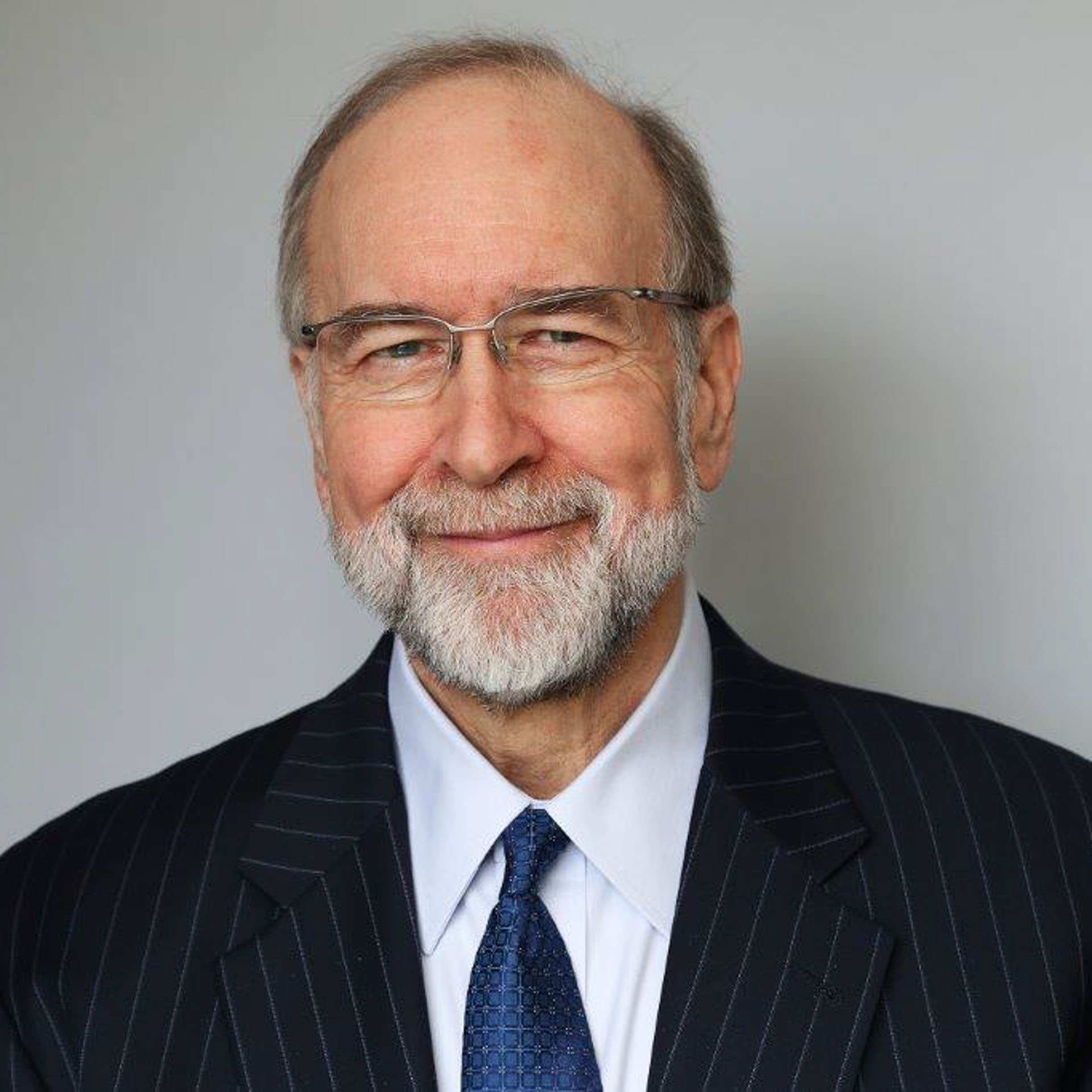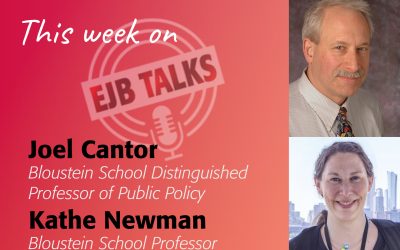Professor Stuart Shapiro welcomes back Professor Carl Van Horn on EJB Talks this week to discuss the newest survey from The Heldrich Center on Workforce Development. Surprisingly, survey results showed that the public shares widespread agreement regarding the state of the economy and what the response to joblessness should be. There is also a persistent concern that for the first time in memory, future generations may be worse off than their parents. Van Horn and Shapiro then delve into the priorities for economic policy at the federal and state level with regards to joblessness and economic security.
Stuart Shapiro
Welcome to EJB Talks. I’m Stuart Shapiro, the Associate Dean of Faculty at the Bloustein School, and the purpose of this podcast is to talk with my colleagues and our alumni about policy, planning, and health, the interaction between these issues, and how they affect people in New Jersey, the United States, and the world.
Over the last couple of weeks, we’ve looked at what lies ahead for the pandemic. Today, we turn to the other related major crisis, the economic recession that we’re in. We’re bringing back Professor Carl Van Horn, who also directs our Heldrich Center on Workforce Development, and has just completed some major surveys on the economy. Welcome back, Carl.
Carl Van Horn
Good to be with you, Stuart.
Stuart Shapiro
Let’s start by talking about these surveys. Can you tell me what your goal was in fielding them?
Carl Van Horn
Yes, for many years, the Heldrich Center has conducted national random samples of the American population, about issues relating to work in the economy. And so this time, we wanted to go back into the field, obviously, during this particularly difficult time, and understand really two things. One, what’s the impact of the COVID-driven recession on them and their families? And then what do they want the government to do, if anything, to help them through this difficult period?
And then it also enables us to compare some of what they say today versus what we’ve collected over a 20 year period, and other periods of economic boom and bust to see whether their experiences and opinions are different now than they were before.
Stuart Shapiro
So I saw the report, which is available on your website now?
Carl Van Horn
Yes, absolutely.
Stuart Shapiro
And there was a lot of stuff in there. A lot of interesting stuff, a lot of surprising stuff. But I’d be interested to know what surprised you the most about the results?
Carl Van Horn
Well, I think there were two parts to it. I mean, the first was that… I should add, we did a pre- and post-election study also. So we also have that to compare. And I was expecting that there would be huge changes, because of the very partisan nature of all elections, but certainly this one. But it turned out there was actually some consensus, significant consensus between people who either identify as Republicans or tend to support them and also those who were Democrats or tend to support Democrats.
And that is; one, that they really want the government to intervene in a way that we’ve never recorded in our 20 years of survey work. So for example, during the Great Recession, we asked a question; Who’s responsible for helping unemployed workers? Is it the government? Is it the individual? Or is it business? And for many years, even during the Great Recession, folks basically split in three. It was a third, a third, a third. This time, half the people said, it’s really the government’s primary responsibility. With the other half divided between, it’s up to the individual or up to the employer.
So then we ask them, okay… we can go back and talk about why I think that is… But then we ask them, okay, what should the government do specifically? And on a variety of policy interventions we tested, there was overwhelming support, generally, and there was no difference across parties. So the most popular one was infrastructure, investments. But there was also a very large, I mean 95%.
Then there was very strong support for financial assistance to small businesses, creating temporary community service jobs, giving people family leave to take care of children or sick relatives, and even providing support to state local governments to avert layoffs of essential workers. So while our elites and policymakers may be very deeply divided on these issues, when it comes to public sentiment, there’s a lot of consensus. So I’d say I was surprised.
Stuart Shapiro
So I wonder if that is a little bit of the Democrats have certainly come out with a unified message on this that the government needs to do more, we need bigger stimulus checks, etc, etc. Meanwhile, the Republicans have had a somewhat muddled message because of President Trump calling for bigger stimulus checks, while conservatives in Congress are rebelling against that. It may be that actually that’s produced an electorate that does see the need for government help there.
Carl Van Horn
I agree, Stuart. I also think that it’s the twin crises. It’s both a public health crisis and an economic one, obviously closely related to each other. But when you think about, and we did when we did the second survey, the first one we did before the election, of course before November. But the second we did up through the second or third week of December, after it was clear to most people that Biden was going to be the new president. But I think during that period that we have, I guess, the second or the third surge of the pandemic, and the unemployment situation continued to deteriorate during that period after the election.
So I think it’s a crisis. I think people understand it, perhaps better than they did the Great Recession, which was really a world financial crisis. And for many people, it was very unclear what was going on, right? Whereas this was pretty much right in front of everybody. You know, we had the highest unemployment rate we’ve had since the Great Depression, in April and May, and it was very sudden. And then, of course, it’s sort of rising again right before and after the election.
Stuart Shapiro
So that brings me to what I was surprised by is that given that sort of impact of COVID, and that its presence in everyone’s lives, I was surprised that people’s concern about job security mirrored where they were in 2013. What did you take from that?
Carl Van Horn
Yeah, I’m glad you asked that because that’s been a constant, and one that we’ve written about at the Heldrich Center a lot. Which is basically that Americans feel and have felt this way for quite some time very insecure in their economic future. You know, for example, one question, which was asked for many, many decades, not by us, but by the Gallup organization. The question is, “Do you think the next generation was better off than yours?” For most of the time up through really the Great Recession period. Right before that, it was, “Yeah, you know, it’s gonna be better.”
But really, since for almost the last 20 years, we’ve been getting, “No, it’s not necessarily going to be.” I mean, obviously, some people still think it will be, but it’s now in negative territory. And I think that relates in terms of reality, two things. One is most people’s incomes against inflation have not increased, their purchasing power has either been flat or declining. And then related to that, of course, the cost of college has been skyrocketing. Right? So the traditional path to greater economic security perhaps was, for many people was, getting a college degree. But now that is receding, in the sense that becomes too expensive for many people.
The second point is that the number of jobs and disruptions during this period has accelerated and the recessions have been deeper. So we talked about in the early 2000s, the jobless recovery. In other words, you didn’t have more jobs coming back. And even though by 2013, the recession had ended officially three years ago, the unemployment rate still remained very high. People dropped out of the labor market, what we call prime-age workers, and their incomes did not increase against inflation. So I think there’s underlying malaise, if you will lead to those conclusions.
Stuart Shapiro
So the COVID recession, in a sense, has just kind of brought to the forefront of people’s minds, trends, long-term trends, and problems in the economy. Is that a fair way of characterizing it?
Carl Van Horn
Certainly, yeah, certainly for the last, you know, 10 to 20 years. You know, if you think about, you know, going back to where there was great anger towards Wall Street. You know, this anger was really left and right, you know, they expressed it differently; but, you know, there are people hurting in all different parts of the country. And by the way, it doesn’t just hurt Republicans or Democrats, it doesn’t just hurt low-income people or well-educated people. It hurts a lot of people.
And so I think there’s general anxiety there. So, even in 2018, when we had the lowest unemployment rate in 50 years, we still got fairly high numbers of people expressing anxiety. They were more positive in their outlook clearly than they were in 2020. But there was still a lot of anxiety then because of what we call the precariousness of the job market. You know, people just don’t know. Can they stay in that job? I’ve got it for now. But can I really? Am I going to be able to retire? Am I going to be able to stay in that job when there are so many people getting laid off around me? And the insecurity really is pretty widespread. I mean, I often say the only people who feel secure in their jobs probably are federal judges and tenured professors. But you know, there aren’t very many people that feel that way anymore.
Stuart Shapiro
Yeah. And you and I both have that fortunate to be tenured professors. And we teach in the Public Policy program here at Bloustein. Which, of course, leads me to ask, what does all this mean for what our priorities should be in public policy at the federal and state level, as pertains to joblessness and economic security?
Carl Van Horn
Well, I think if we’re to follow both the economics and the public sentiment, it should be to invest deeply in not only recovering quickly so that we don’t score the individuals in the economy. But we also should be investing in the long run, make the economy stronger and to create better jobs for people. Right. So what does that mean?
It means being able to work hard to earn a living and be able to support your family, which clearly many people can’t do. If they have precarious jobs, or if they have gig jobs that can disappear overnight. I mean, think about all the Uber and Lyft drivers who were getting by. And now in a period of six weeks, most of them lost that opportunity, right? I mean, and so that difficulty really is one that I think needs to be addressed both in the short term, so that we don’t repeat the same mistakes we made in the Great Recession, which were that the stimulus was too small. And it was a one-shot. And so what happened also was we had — and this is wishful thinking on my part — but we need to try to find that bipartisan consensus that we had in April and May, to get these packages through that. And you know, some version of them that President Biden’s proposing, because if we don’t do that, then we’re going to be in the same position we were in the Great Recession, meaning a very slow recovery, a lot more people going into poverty, people dropping out of the labor market. And all of this is bad for everyone, you know, not just to people that drop out, but as you know, as to what it means the economy is smaller, or less productive. And it’s really bad for everyone.
Stuart Shapiro
Yeah, the one other thing I’d like to see is — and I think a mistake that was made in the Obama recovery, and there was a lot that was good about the Obama recovery — is that it was too hidden. In other words, people didn’t see what the government was doing for them. And that led I thin, to a lack of appreciation, and paved the way for some of what came afterward there.
Carl Van Horn
No, I think that’s right. I mean, if you give people a payroll deduction, for example, which was a lot of the stimulus, it’s invisible. It happens and you have more money in your pocket. But, you know, for people that have lots of money, it’s really essentially irrelevant. For people who are lower middle class or in poverty it’s helpful, but it’s such a small amount they don’t really see the benefit. And so, you know, I agree, and that of course is the difference between the way President Roosevelt went about it. You know, he was certain that he wanted things that were visible to people, hence, the WPA jobs programs that built infrastructure. And I think that’s partly why it’s so popular because I think people want the government to do things they can see and they appreciate, that directly benefit them. And so that’s why I think we see those being roundly supported by the folks in our most recent survey
Stuart Shapiro
Absolutely. And so now, I’ll ask you to put your political science hat on for a second. What are the likelihoods we see these types of actions?
Carl Van Horn
Well, you know, I think we’ll some of it will happen. What I mean by that is I think that infrastructure projects, you know, they were long delayed. Some of our listeners may recall, President Trump had “infrastructure week” I think three or four times. And then nothing happened. But that’s because there’s bipartisan support for them, not just because it’s pork barrel for politicians, it is that but also because there’s a great need in the country for this, to remain a competitive nation. And the business community and organized labor are completely on the same page on this.
And the last point I make is, there’s nothing better that you can argue for borrowing money than an infrastructure project that’s going to last 50 years. Okay, so you can say we’re actually borrowing to invest in our future, and we’re gonna pay it off over a period of time, you know, the Tappan Zee Bridge has been there for, say, 70, 80 years or whatever. I may be wrong exactly about that. But something like that. So, you know you will long have paid off those bonds and that debt to build these big projects, and they’ll still be benefiting. So I think there’s consensus probably around helping small and medium-sized business businesses that have been so devastated by this because it’s mainstream business. It’s part of, you know, I think both Republicans and Democrats agree on that.
And also I would say extending unemployment insurance, which I neglected to mention before. I think that isn’t as popular, but it remains popular, because it is a direct way to help people who lost a job through no fault of their own. And I think that likely is to be supported. Now, the question is, how large it will be, which maybe is your next question. That’s a different story. I mean, that may not be large enough to solve the recovery that I think we need. But I think they’ll certainly be significant action on those.
Stuart Shapiro
How much of this do you think will be handled by or part of recovery partially fueled by the fact that we are starting to get vaccines out? The Biden administration is every day seeming to up its goals in terms of people vaccinated? That’s got to be able to make a difference.
Carl Van Horn
It does. But you know, if you listened to Chairman Powell, the Federal Reserve Chair yesterday, he talked about the uncertainty of how many people, how quickly people, can be vaccinated. And whether the variants that are coming — as apparently happens all the time — whether they’re more deadly to people who become infected, in addition to being more transmissible. In other words, infecting more people, from a given person who’s already infected. And so therefore, he announced that they’re going to keep interest rates at near-zero for the foreseeable future. I mean, I think that those are the continuing uncertainties.
Unemployment is going up again. We’ll find out next Friday, what the actual numbers are, but the unemployment insurance claims are still increasing. They’re up around a million a month now additional. So we’re not out of the woods by any means. I think the idea that many economists have all this hope for is a V-shaped recovery, not just for the well off, who can work remotely and so on. But for everyone, I think is further receding. And I think that’s going to give more urgency to putting some more money into the economy on the part of the government.
Stuart Shapiro
I certainly hope you’re right. Would you characterize yourself as more or less optimistic than you were when we had you on eight months ago?
Carl Van Horn
I would say I’m more optimistic because of the fact that then we were dealing with essentially an out of control public health crisis, which to anybody who was paying attention was not being handled well. Okay? And maybe couldn’t be handled well, but nonetheless, it was just devastating. And that was the first search. We were talking about in May, I think it was. And then you also had, clearly gridlock. And some of it was between President Trump and his own members of his own party. Some of it was Democrat, Republican. So there was a lot of that. I think that I’m more optimistic because you have the leadership and awareness obviously of those who want to do this, that is to say put more money into the recovery.
I also think you have more consensus in the business community. That needs to happen as was true back in May. And I think you also have the fact that we don’t know how long it will take to actually reach the “new normal.” In which case people will still be holding back. You know, those who have money to spend, maybe, you know, they may be saving it because they don’t know what’s going to happen next. So the lid, if you will, on the economy hasn’t been taken off yet due to the uncertainties, but I think they’re much better in my view than when we had no vaccine. We had no idea how we were going to defeat this public health crisis.
Stuart Shapiro
Great. Well, thank you again, for coming on. I could ask a dozen more questions. But after 20 minutes or so we start losing listeners. So I’m gonna stop there. (laughing) Thanks so much, Carl.
Carl Van Horn
Thank you. Good to be with you as always, Stuart.
Stuart Shapiro
Also a big thank you to our production team, Amy Cobb and Karyn Olsen As always, we’ll be back next week with another talk from another expert at the Bloustein School. Until then, stay safe.




